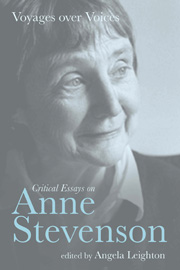Book contents
- Frontmatter
- Contents
- Notes on Contributors
- Acknowledgements
- ‘Making Poetry’
- 1 ‘Voyages over voices’: Introduction
- 2 The Melting Metaphor
- 3 ‘Between us’: Letters and Poems of Stevenson and Bishop
- 4 Mothers, Mirrors, Doubles: Anne Stevenson's Elegies for Sylvia Plath
- 5 Staging Second Thoughts: The Poetry of Anne Stevenson
- 6 ‘Making Poetry’: The Exemplary Anne Stevenson
- 7 ‘A curved adventure’: Romanticism and the Poetry of Anne Stevenson
- 8 The Nature of Anne Stevenson
- 9 Anne Stevenson and the Poetry of Place
- 10 Compacting Time: Anne Stevenson's Poems of Memory
- 11 ‘Not exactly a persona’: Pronouns in Anne Stevenson's Poetry
- 12 ‘To serve a girl on terrible terms’: Anne Stevenson's Writing Selves
- 13 Talking and Singing: Anne Stevenson's Variations on a Rhythmical Theme
- 14 ‘Time will erase’: Anne Stevenson and Elegy
- 15 Observing the Overhearing: The Anne Stevenson Papers in Cambridge University Library
- 16 Bibliography of Anne Stevenson's Published Works
- General Index
- Index of Stevenson's Works
5 - Staging Second Thoughts: The Poetry of Anne Stevenson
- Frontmatter
- Contents
- Notes on Contributors
- Acknowledgements
- ‘Making Poetry’
- 1 ‘Voyages over voices’: Introduction
- 2 The Melting Metaphor
- 3 ‘Between us’: Letters and Poems of Stevenson and Bishop
- 4 Mothers, Mirrors, Doubles: Anne Stevenson's Elegies for Sylvia Plath
- 5 Staging Second Thoughts: The Poetry of Anne Stevenson
- 6 ‘Making Poetry’: The Exemplary Anne Stevenson
- 7 ‘A curved adventure’: Romanticism and the Poetry of Anne Stevenson
- 8 The Nature of Anne Stevenson
- 9 Anne Stevenson and the Poetry of Place
- 10 Compacting Time: Anne Stevenson's Poems of Memory
- 11 ‘Not exactly a persona’: Pronouns in Anne Stevenson's Poetry
- 12 ‘To serve a girl on terrible terms’: Anne Stevenson's Writing Selves
- 13 Talking and Singing: Anne Stevenson's Variations on a Rhythmical Theme
- 14 ‘Time will erase’: Anne Stevenson and Elegy
- 15 Observing the Overhearing: The Anne Stevenson Papers in Cambridge University Library
- 16 Bibliography of Anne Stevenson's Published Works
- General Index
- Index of Stevenson's Works
Summary
Self-reproof, self-correction, apostasy, disavowal, revision, regret – explicitly stated versions of all these can be found throughout the poetry of the twentieth century, from Yeats's ‘Did that play of mine send out / certain men the English shot?’ to Eliot's ‘That was a way of putting it – not very satisfactory / A periphrastic study in a worn-out poetical fashion’, and Auden's rebuking himself, halfway through ‘In Praise of Limestone’, for ruining ‘a fine tenor voice / for effects that bring down the house’. Asked to account for the prevalence of the motif, a cynic might suggest that, in such self-flagellating circumstances, an author can only win. A reader who is not immediately disarmed by authorial self-reproof can at least be expected to feel surprise. Since writers are wont to puff and preen, it makes a nice change to hear a mea culpa. And for the author there is the further potential side-benefit of being credited with a range of desirable qualities, including modesty, realism, honesty and a sense of proportion. Eating humble pie can be an opportunity for taking pride.
One of Anne Stevenson's main influences, Elizabeth Bishop, is fond of second thoughts like these, finding that repeated glances often occasion a change of mind. As Denis Donoghue has written, when Bishop repeats a word, ‘watch out, it never means what it has already said’. Examples of this revisionary habit abound in her poetry: one thinks of the italicised, self-contradicting, final verse of ‘The Armadillo’, the self-critical despair which climaxes in the ‘Write it!’ of ‘One Art’, and the poker-faced, introductory doubling-back of ‘The Monument’:
Now can you see the monument? It is of wood
built somewhat like a box. No. Built
like several boxes in descending sizes
one above the other.
- Type
- Chapter
- Information
- Voyages over VoicesCritical Essays on Anne Stevenson, pp. 71 - 82Publisher: Liverpool University PressPrint publication year: 2010

